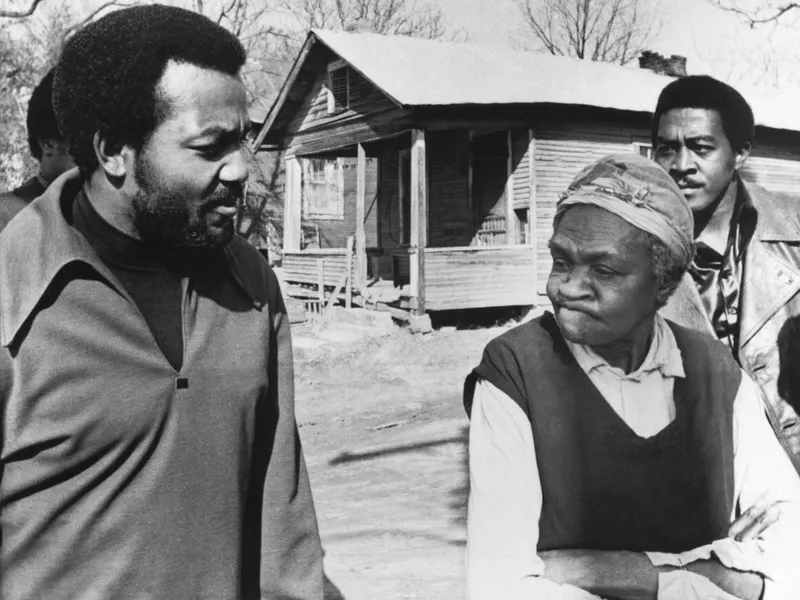
Former football great Jim Brown, left, president of the Black Economic Union, confers with a woman in her neighborhood of Holly Springs, Mississippi, in 1970. Brown led about 25 black athletes for a firsthand look at conditions his BEU hoped to improve. In the background is Leroy Kelly of the Cleveland Browns. AP Photo
Arguably the greatest running back in NFL history, Jim Brown was a different kind of activist and fearless in his efforts off the field.
In the 1960s, Brown founded what later became known as the Black Economic Union to help African-Americans advance economically.
When filming of the war classic, “The Dirty Dozen,” began to cut into the start of Cleveland Browns’ training camp in 1966, Brown was threatened with a fine by owner Art Modell and responded by retiring from football.
He helped organize the famous Cleveland Summit of 1967, also known as the Muhammad Ali Summit. Brown brought together Ali, Kareem Abdul-Jabbar, Bill Russell and other famous Black athletes in response to Ali’s decision not to serve in the Vietnam War.
Long after Brown’s career ended, he continued to fight for social change, founding Amer-I-Can in 1988 to curb gang violence and educate troubled youth.
“I run a program called Amer-I-Can,” he said.” We’ve taught in prisons, schools, juvenile facilities and we teach in the community. We have the greatest record from the standpoint of dealing with grade point averages, disciplinary action and attendance in schools.”
Like all humans, Brown wasn’t perfect. He was flawed. He had some run-ins with the law over the years, including accusations of violence against women. He also said that he wouldn’t have followed Colin Kaepernick’s example in kneeling for “The Star-Spangled Banner.”
As sportswriter Howard Bryant said, “Jim Brown was heroic, but he was no hero.” Dave Zirin, the sports editor for The Nation, who wrote the 2018 biography “Jim Brown: Last Man Standing,” agreed with the assessment: “I think that’s the best way to look at his life.”
In “Last Man Standing,” Zirin looked at the complicated Brown and his fascinating life story.
Football is the closest thing we have in this country to a national religion, albeit a religion built on a foundation of crippled apostles and disposable martyrs. In this brutal church, Jim Brown is the closest thing to a warrior Saint.
On an NPR interview, Zirin added: “He’s always had this strain of conservatism in his politics that Black people do not achieve advancement through the politics of protest, but through the politics of earning as much money as possible, and trying to get out of the capitalist system whatever they can for the purposes of building economic self-sufficiency. And protest is an impediment to that in the mind of Jim Brown. And those have always been his politics.”
Brown could have lived his post-football life in the gated bubble of wealth and fame. But he chose to be part of the community, with the people, an instrument for social good to bring about positive change.
“The power is between your ears,” Brown once said. “The power is in your heart.”